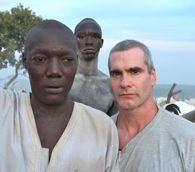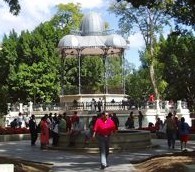Tag: Politics
Cuba, Undistilled
by Chris Ryan | 12.20.14 | 9:11 PM ET
Tired of hearing pundits pontificating about Cuba, Chris Ryan wanted to see the island for himself -- before the coming of Best Western and American Express
Traveling the Hunter S. Thompson Trail in South America
by Eva Holland | 06.04.14 | 3:22 PM ET
Long before "Fear and Loathing," Hunter S. Thompson roamed South America. Eva Holland interviews author Brian Kevin about following in his footsteps decades later.
Will Aun San Suu Kyi’s Election Victory Spur Travel to Myanmar?
by Jim Benning | 04.02.12 | 5:19 PM ET
Indeed, the Nobel Peace Prize winner’s election to a parliamentary seat “may further fuel demand,” reports Jayne Clark at USA Today.
But then, travel to the country formerly known as Burma was already on the rise, thanks in part to a growing sense of optimism that positive changes are afoot in the country.
Tourist arrivals rose by 20% in 2011, according to the Myanmar Times, though the 816,000 tally is dwarfed by the 19 million tourists who visited neighboring Thailand.
A number of U.S.-based tour operators are for the first time offering tours to the once-reclusive nation. Demand for Overseas Adventure Travel’s Burma tours is so great, the Boston-based company has increased its 2012 departures from 40 to 61 and is hoping to schedule more.
At any rate, it’s good to see.
The Concerto Inspired by Tahrir Square
by Jim Benning | 01.25.12 | 6:12 PM ET
Arab American composer Mohammed Fairouz watched the uprising in Tahrir Square on TV a year ago today. As he looked on, with the volume off, he began composing a piece of music. “Tahrir for Clarinet and Orchestra,” now complete, is “the first movement of what will eventually become a concerto in three movements,” according to a fascinating report on PRI’s The World.
You can hear the movement in its entirety below, but the radio segment is well worth a listen, particularly Fairouz discussing the various facets of the uprising he was trying to evoke through the music.
Interview with Henry Rollins: Punk Rock World Traveler
by Jim Benning | 11.02.11 | 12:40 PM ET
Jim Benning asks the musician about his new book of photographs and how travel has humbled him
Electronic Surveillance Abroad: ‘Sophisticated and Pervasive’
by Michael Yessis | 09.27.11 | 5:16 PM ET
Also: A little scary. Ellen Nakashima and William Wan illuminate the conditions business travelers and government officials are presumed to face when traveling to China and some other countries. From the Washington Post:
Security experts also warn about Russia, Israel and even France, which in the 1990s reportedly bugged first-class airplane cabins to capture business travelers’ conversations. Many other countries, including the United States, spy on one another for national security purposes.
But China’s brazen use of cyber-espionage stands out because the focus is often corporate, part of a broader government strategy to help develop the country’s economy, according to experts who advise American businesses and government agencies.
“I’ve been told that if you use an iPhone or BlackBerry, everything on it—contacts, calendar, e-mails—can be downloaded in a second. All it takes is someone sitting near you on a subway waiting for you to turn it on, and they’ve got it,” said Kenneth Lieberthal, a former senior White House official for Asia who is at the Brookings Institution.
One anonymous security expert buys a new iPad when s/he visits China, then never uses it again.
Buzkashi, Revisited
by Michael Yessis | 09.13.11 | 10:57 AM ET
The Lunatic Express author and World Hum contributor Carl Hoffman looks at how buzkashi, Afghanistan’s goat-based national sport, has changed since 9/11.
What was originally a pickup game played at weddings and festivals has become a game of one-upmanship between rich big men getting richer and bigger every day. Who has the most horses? The most expensive horses, which can cost $50,000 in a country where the average annual wage is $370? The best stable of chapandazan? Players have always been sponsored—given good horses to ride for the glory of the horse’s owner and small profit for the rider—but now a few have made themselves the world’s first professional, full-time buzkashi players.
We published David Raterman’s story about buzkashi, aka buskaschee, in 2002. He recently drew from the story for a scene in his novel, The River Panj.
Ai Weiwei’s Beijing
by Michael Yessis | 08.30.11 | 12:37 PM ET
The Chinese artist has broken his post-detention silence in a piece for Newsweek. He writes of Beijing:
I feel sorry to say I have no favorite place in Beijing. I have no intention of going anywhere in the city. The places are so simple. You don’t want to look at a person walking past because you know exactly what’s on his mind. No curiosity. And no one will even argue with you.
None of my art represents Beijing. The Bird’s Nest—I never think about it. After the Olympics, the common folks don’t talk about it because the Olympics did not bring joy to the people.
There are positives to Beijing. People still give birth to babies. There are a few nice parks. Last week I walked in one, and a few people came up to me and gave me a thumbs up or patted me on the shoulder. Why do they have to do that in such a secretive way? No one is willing to speak out. What are they waiting for? They always tell me, “Weiwei, leave the nation, please.” Or “Live longer and watch them die.” Either leave, or be patient and watch how they die. I really don’t know what I’m going to do.
Wired: Public Transit is a ‘Civil Rights Issue’
by Eva Holland | 07.27.11 | 10:54 AM ET
Over at Autopia, Jason Kambitsis breaks it down:
[A]ccess to transportation is key to connecting the poor, seniors and those with disabilities to jobs, schools, health care and other resources. It is essential to widening opportunities for all. Many of us take our mobility for granted, but getting around can be a real challenge for millions of Americans… According to the [Leadership Conference on Civil and Human Rights] report, the average cost of owning a car is just shy of $9,500. That may not sound like much until you realize the federal poverty level is $22,350 for a family of four. One-third of low-income African-American households do not have access to an automobile. That figure is 25 percent among low-income Latino families and 12.1 percent for whites.
We’ve been keeping tabs on a variety of proposed high-speed rail plans over the years. The Autopia piece offers an important reminder that less-flashy investments in public transportation—from buses to bike lanes to more pedestrian-friendly streets—shouldn’t be forgotten, either.
Tunisia Tackles Tourism Shortfall with Dark Humor
by Eva Holland | 07.14.11 | 5:49 PM ET
Tunisia’s role in the Arab Spring wasn’t as widely reported as, say, Egypt’s or Libya’s. But word about the country’s revolution has still spread far enough to cut tourism in half—and the Tunisian authorities are hoping to regain some of that lost revenue through a series of ads poking fun at the unrest.
According to the Guardian, one ad shows a woman enjoying a massage under the caption, “They say that in Tunisia some people receive heavy-handed treatment.” Another depicts an ancient archaeological site, with the tag line, “They say Tunisia is nothing but ruins.”
Tasteless? I suppose if I was a Tunisian civilian who’d been shot at or abused by police during the uprising, I might not be amused. But I think tackling a country’s reputation head-on is a good thing—and hey, as Australia learned a few years back, a little controversy can go a long way.
Democracy and the Zócalo
by Maya Kroth | 03.16.11 | 10:14 AM ET
As labor protests raged in Wisconsin, Maya Kroth found herself in Oaxaca, Mexico, getting in touch with American ideals
Protests in Egypt: Five Links for Travelers
by Eva Holland | 02.03.11 | 3:14 PM ET
The protests in Egypt are entering their second week, and the flow of news stories, blog posts, links, tweets and video can be overwhelming. Here are five links, in case you’ve missed any of them:
- The AP has a round-up of the government travel warnings and cruise and tour cancellations that began cropping up late last week.
- Reuters has coverage of the evacuations of foreign nationals that began earlier this week.
- Al-Jazeera English has been live-blogging daily from Cairo, Alexandria and Suez—a must-read.
- Andrew Sullivan’s The Daily Dish is another good resource.
- Finally, The Atlantic has a really well-done video compilation of the early days of the protests.
A ‘Commie-Pinko’ Goes to An All-Inclusive Resort
by Michael Yessis | 02.03.11 | 12:23 PM ET
Some interesting twists in this New York Times Lives essay by Said Sayrafiezadeh:
To my surprise, I wasn’t really bothered by the fact that, as we were being driven to the gated entrance of the place, Mexican resort workers were trekking the mile on foot in 90-degree heat. Nor by the fact that everyone, including the man who mopped the floors, seemed to be happier for the vacationers than they were for themselves. Nor even the fact that on the second day of our stay, the United States won a major sporting event, causing just about every male resortgoer to jump into the swimming pool screaming: “U.S.A.! U.S.A.!”
No, the real problem was that the place was immeasurably cheap. Especially the food but also the accommodations. The Web site advertised a wonderful selection of gourmet cuisine from around the world. Instead, there was runny flan and soggy farfalle. There was iceberg lettuce. There were giant columns made of faux marble and a long spiraling staircase ascending to a saxophonist playing bad jazz. This wasn’t wealth; this was the illusion of wealth, a theme park of opulence for those who have no chance of ever attaining it, including myself. I was irritated by this gulf of reality. My irritation was compounded by the understanding that my fellow countrymen and -women seemed to be unfazed by the resort’s shortcomings. They ate heartily and merrily, without any apparent discernment. I despised them for their ability to enjoy what I believed should not be enjoyed. In fact, I mocked them for it. I mocked them in the way that middle-class people will mock poor white people for eating sandwiches made with marshmallow spread. These weren’t poor white people, though; they were middle-class white people. And I was no longer the true son of communists. I was a member of the bourgeoisie, and a snob.
Is ‘Sarah Palin’s Alaska’ Worth Watching, ‘Just for the Scenery’?
by Eva Holland | 11.22.10 | 4:21 PM ET
Jaunted checked out the new reality show and came back with an answer: “You betcha.”
‘American Traveler Dignity Act’ Introduced in the House
by Eva Holland | 11.19.10 | 2:08 PM ET
The legislation was proposed by Texas Representative Ron Paul, and would strip TSA screeners’ of their immunity from prosecution. From Paul’s speech to the House:
My legislation is simple. It establishes that airport security screeners are not immune from any US law regarding physical contact with another person, making images of another person, or causing physical harm through the use of radiation-emitting machinery on another person. It means they are subject to the same laws as the rest of us.
Moving beyond the current controversy over scanners and pat-downs, Paul also commented more broadly on airline security since 9/11:
I warned at the time of the creation of the TSA that an unaccountable government entity in control of airport security would provide neither security nor defend our basic freedom to travel. Yet the vast majority of both Republicans and Democrats then in Congress willingly voted to create another unaccountable, bullying agency—in a simple-minded and unprincipled attempt to appease public passion in the wake of 9-11. Sadly, as we see with the steady TSA encroachment on our freedom and dignity, my fears in 2001 were justified.
I’m not sure that going after individual screeners with, say, sexual harassment charges really gets to the root of the issue; they aren’t the ones making policy. Still, it’s heartening to see travelers’ concerns being taken up at the highest levels in Washington. (Via Gadling)
World Travel Watch: Tube Strike in London, Election Worries in Egypt and More
by Larry Habegger | 11.17.10 | 1:26 PM ET
Larry Habegger rounds up global travel news
My Own Mexican Revolution
by Sarah Menkedick | 11.12.10 | 11:17 AM ET
The catcalls and machismo culture were poisoning Sarah Menkedick's relationship with the country she loved. Would she change Mexico, or change herself?
World Travel Watch: Traffic Restrictions in Italy, Conflict on the Thai-Burmese Border and More
by Larry Habegger | 11.10.10 | 1:29 PM ET
Larry Habegger rounds up global travel news
World Travel Watch: G20 Alert in Seoul, Volcano in Indonesia and More
by Larry Habegger | 11.03.10 | 3:14 PM ET
Larry Habegger rounds up global travel news
Will a Road Through the Serengeti Kill Tanzania’s Giant Tourism A.T.M.?
by Michael Yessis | 11.02.10 | 11:45 AM ET
Tanzania president Jakaya Kikwete wants to build a highway through the Serengeti, the location of the Great Migration, which, Jeffrey Gettleman writes, is “widely considered one of the most spectacular assemblies of animal life on the planet.” What will happen if the proposed road gets built?
Scientists and conservation groups paint a grim picture of what could happen next: rare animals like rhinos getting knocked down as roadkill; fences going up; invasive seeds sticking to car tires and being spread throughout the park; the migration getting blocked and the entire ecosystem becoming irreversibly damaged.
Tourism could also be a casualty.
Hundreds of thousands of people here depend on tourism for a living. And the Serengeti is like a giant A.T.M. for Tanzania, attracting more than 100,000 visitors each year, producing millions of dollars in park fees and helping drive Tanzania’s billion-dollar safari business, an economic pillar. “If anything bad happens to the Serengeti,” said Charles Ngereza, a Tanzanian tour operator, “we’re finished.”
Jeffrey Gettleman narrates an accompanying video.
- « Prev Page
- Next Page »





